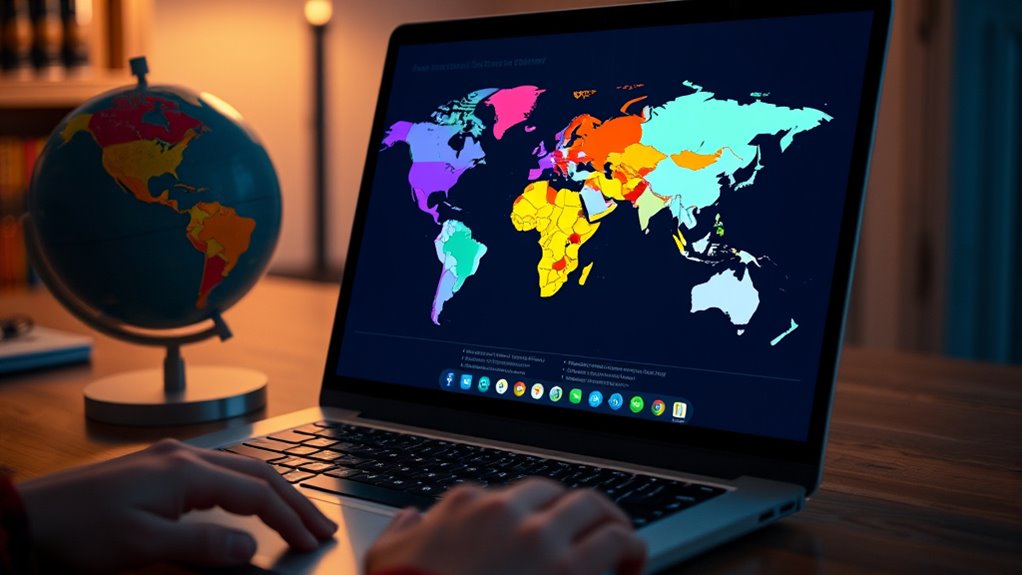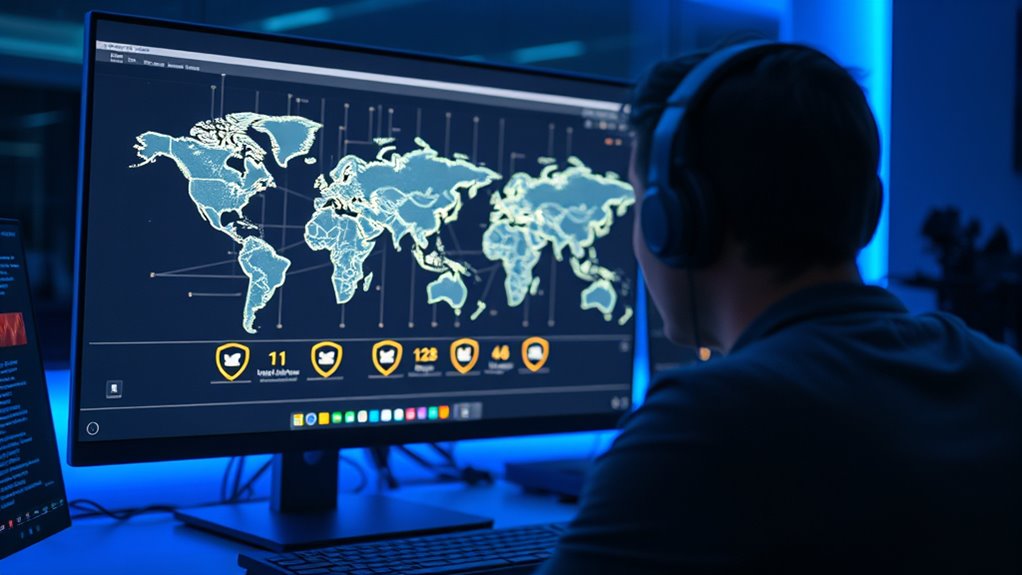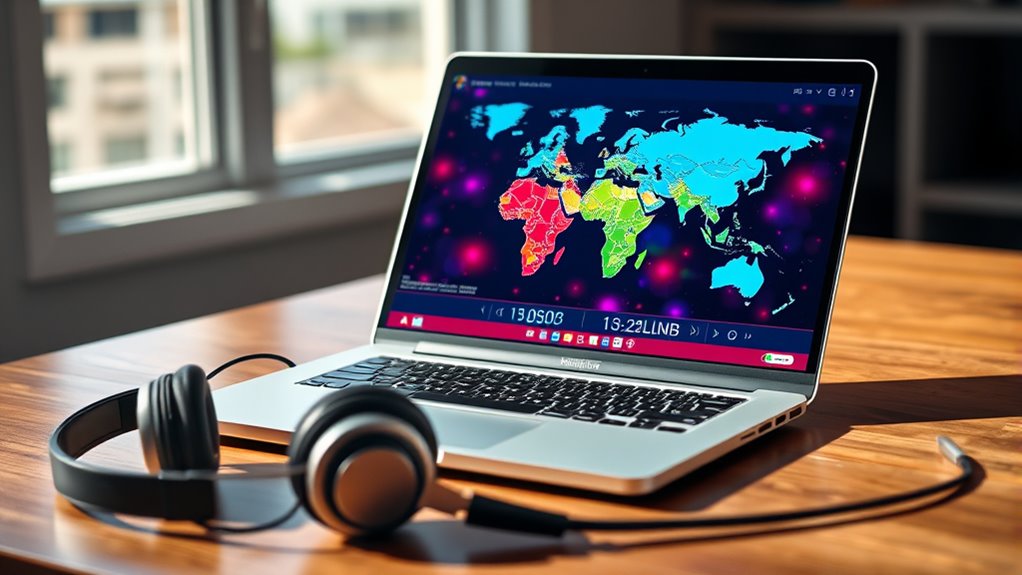To stream international content safely, start by understanding how geo-blocking restricts access based on your IP address, often due to licensing rules. Using unofficial VPNs or proxies can pose security risks and may violate laws or service terms. Instead, choose reputable VPNs that prioritize privacy and comply with legal standards, ensuring your connection is secure and your streaming remains within legal boundaries. Keep exploring to discover more effective strategies for safe, unrestricted streaming.
Key Takeaways
- Understand how geo-blocking restricts access based on IP location to comply with regional licensing agreements.
- Use reputable VPNs that respect privacy laws and ensure secure, authorized access to international content.
- Verify content licenses and regional rights before attempting to stream to avoid legal violations.
- Avoid unofficial proxies or VPNs that may compromise security or violate service terms.
- Follow best security practices like encryption and monitoring to protect your data and maintain legal compliance.
Understanding How Geo-Blocking Works

Geo‑blocking works by restricting access to online content based on a user’s geographic location. It primarily relies on IP address tracking to determine where you’re connecting from. When you try to access a website or streaming service, your IP address is analyzed to identify your approximate location. This process helps enforce regional licensing agreements, which specify where content can legally be shown. If you’re in a country where the content isn’t licensed, access gets blocked. Content providers use geo-blocking to comply with copyright laws and regional restrictions. This technology ensures that only viewers in permitted areas can stream certain shows, movies, or services. Additionally, many streaming platforms employ high-quality projection technology to deliver optimal viewing experiences, which can be affected by geo-restrictions. Understanding how IP address tracking and regional licensing work together can also help you recognize the importance of digital privacy in online streaming. For instance, IP masking tools can sometimes help users bypass these restrictions, though they may violate terms of service. Exploring regional licensing agreements further reveals how content distribution rights are negotiated and enforced. Recognizing the role of predictive modeling in educational data mining can also shed light on how data analysis enhances content delivery and regional targeting. By understanding how IP address tracking and regional licensing work together, you can better grasp why some content is unavailable in your location.
Common Reasons Behind Content Restrictions

Many content providers restrict access to their material to comply with licensing agreements and legal requirements. Regional licensing is a key factor, as rights are often sold to specific countries or territories. This means that a streaming service may only have the rights to show content within certain regions, limiting availability elsewhere. Content licensing agreements prevent providers from offering certain shows or movies globally, ensuring they honor contractual obligations. These restrictions protect intellectual property rights and help copyright owners monetize their content appropriately. As a result, you may encounter geo-blocks when trying to access content outside authorized regions. Understanding these common reasons behind content restrictions helps clarify why some streams are unavailable in your location and highlights the importance of respecting licensing agreements. Additionally, regional restrictions are often enforced through technological measures that detect your location and block access accordingly, which can involve geolocation tracking to enforce these limits. Moreover, many platforms utilize digital rights management systems to control how content is distributed and viewed across different regions. Implementing geolocation detection is a common method used to ensure compliance with licensing terms and prevent unauthorized access. Recognizing the role of privacy policies is also crucial, as they often govern how location data is collected and used to enforce these restrictions.
Risks of Using Unofficial VPNs and Proxies

Using unofficial VPNs and proxies can expose you to security vulnerabilities that compromise your data. You might also face privacy risks if these services log your activity or leak your information. Plus, there’s a chance you could encounter legal consequences if they violate local laws or regulations. Additionally, relying on unverified tools can hinder your ability to securely access geo-restricted content, undermining the benefits of safe streaming practices. Implementing best VPNs helps ensure your online activity remains protected and private. Staying informed about AI security vulnerabilities can further enhance your overall digital safety.
Security Vulnerabilities Increase
While unofficial VPNs and proxies might seem like quick solutions to bypass restrictions, they often introduce serious security risks. These tools can expose your device to malware, data theft, and hacking, especially when they lack proper encryption. Using unreliable proxies also makes you vulnerable to malicious actors who exploit weaknesses in geo restriction techniques and regional licensing systems. You might unknowingly leak your IP address or sensitive information, compromising your privacy. Here’s a quick comparison:
| Risk | Impact |
|---|---|
| Malware infection | Device compromised or data stolen |
| Data interception | Personal info accessed by hackers |
| IP leaks | Exposure of your true location |
| Lack of encryption | Data vulnerable during transmission |
| Malicious proxies | Injecting harmful content or spyware |
Additionally, many unofficial VPNs and proxies do not adhere to security best practices, further increasing your vulnerability.
Data Privacy Risks
Although unofficial VPNs and proxies promise to bypass restrictions, they often put your data privacy at serious risk. Many of these services lack proper data encryption, leaving your sensitive information vulnerable to hackers or third parties. Since they don’t always prioritize user consent, your browsing habits and personal data could be collected and shared without your knowledge. Unofficial VPNs may also log your activity, creating privacy breaches that defeat the purpose of using a VPN in the first place. You might unknowingly expose yourself to malware or data theft if the service is untrustworthy. To protect your privacy, always choose reputable VPN providers that use robust data encryption and clearly obtain user consent, ensuring your information remains secure while streaming international content. Additionally, cybersecurity vulnerabilities highlight the importance of trustworthy upgrades and modifications, emphasizing the need for secure and reliable services in all aspects of digital privacy management. Being aware of data privacy risks can help you make informed decisions when selecting security tools to safeguard your online presence.
Legal Consequences Possible
Employing unofficial VPNs and proxies may seem like an easy way to bypass geo-restrictions, but it can lead to serious legal repercussions. Many countries have laws protecting digital rights and intellectual property, and using unapproved tools can violate these regulations. Streaming content through unofficial VPNs may infringe on copyright laws, exposing you to fines or legal action. Service providers often have strict terms of service that prohibit such activities, and violations can result in account suspensions or bans. Governments are increasingly monitoring unauthorized access to geo-blocked content, making it risky to rely on unofficial solutions. Additionally, the use of cultural and regional content can be subject to licensing restrictions that unauthorized VPNs may violate. Relying on licensed streaming services ensures compliance with legal standards and reduces the risk of penalties or legal trouble from using unapproved VPNs or proxies. Furthermore, engaging with official streaming platforms helps support content creators and the broader industry. Implementing authorized access methods can also help avoid potential security risks associated with unreliable or malicious VPN providers. Being aware of wave and wind protections can further safeguard your connection and reduce vulnerabilities.
Choosing Safe and Legal Methods to Bypass Geo-Restrictions

To bypass geo-restrictions safely and legally, you should use legitimate VPNs that respect privacy laws. Always verify that the content you access is authorized for your region to avoid copyright issues. Choosing reputable tools and understanding content rights helps you stay within legal boundaries while enjoying the content you want.
Use Legitimate VPNs
Using legitimate VPNs is one of the safest ways to bypass geo-restrictions while staying within legal boundaries. A good VPN setup ensures your online activity remains private and secure, preventing potential legal issues. When choosing a VPN, prioritize providers known for maintaining streaming quality; slow connections can ruin your experience. Many reputable VPNs offer optimized servers for streaming, giving you smooth playback. Remember, not all VPNs are created equal—some may jeopardize your privacy or violate terms of service. Always opt for trusted services that respect legal boundaries and offer reliable connections. By doing so, you can enjoy international content safely without risking security or performance issues.
- Reliable VPN providers with strong privacy policies
- Servers optimized for streaming quality
- User-friendly VPN setup process
- Consistent connection speeds for uninterrupted streaming
Verify Content Rights
Choosing a legitimate VPN is just one part of safely bypassing geo-restrictions; confirming content rights is equally important. Before streaming, check the content licensing and regional licensing agreements for the material you want to access. Content licensing determines who can legally view a show or movie in a specific region, so bypassing restrictions without permission can violate copyright laws. To stay safe and legal, verify that the platform or service has the rights to stream the content in your location. Use official sources or reputable streaming services that clearly state their licensing agreements. This not only protects you from legal issues but also ensures the content you’re accessing is authorized and high quality. Always prioritize verifying content rights before attempting to bypass geo-restrictions.
Best Practices for Streaming International Content Securely

Ensuring the secure streaming of international content requires implementing effective practices that protect your content from unauthorized access. To navigate regional licensing and content licensing restrictions, you should use geo-restriction tools to control where your content is available. Regularly update your licensing agreements to stay compliant with regional laws. Employ strong encryption methods to safeguard your streams. Additionally, monitor your streams for unusual activity that might indicate piracy or unauthorized access.
Secure international streaming with geo-restrictions, encryption, and vigilant monitoring to prevent unauthorized access and ensure compliance.
- Use geo-restriction tools to enforce regional licensing restrictions
- Keep licensing agreements current with regional laws
- Implement robust encryption for all streams
- Regularly monitor for suspicious activity or breaches
Tips for Ensuring Your Online Privacy While Bypassing Geo-Blocks

While bypassing geo-blocks can help you access a wider range of online content, it also raises important privacy concerns. To protect yourself, choose a reputable VPN with strong encryption and a strict no-logs policy. If you encounter VPN troubleshooting issues, consult the provider’s support resources to resolve connectivity problems quickly. When setting up your streaming device, ensure your VPN is correctly configured—this prevents leaks that could expose your location. Use privacy tools like a kill switch to cut internet access if the VPN drops unexpectedly. Avoid free VPNs, which may compromise your data. Regularly update your VPN app and firmware on your streaming device to stay protected. Following these tips helps you enjoy international content securely without sacrificing your online privacy.
Frequently Asked Questions
Can Geo‑Blocking Vary Between Different Streaming Platforms?
Yes, geo-blocking can vary between streaming platforms. You might find some platforms restrict content due to regional licensing agreements or content censorship policies, while others offer broader access. These differences depend on each platform’s licensing deals and legal restrictions in your country. So, even if one platform allows access to certain international content, another might block it based on regional licensing or content censorship laws.
Are There Legal Consequences for Bypassing Geo-Restrictions?
Did you know that over 20% of internet users have attempted to bypass geo-restrictions? Bypassing geo-restrictions can lead to serious legal risks, including fines or account bans. Authorities are increasingly cracking down on piracy concerns, making it risky to access content illegally. You should always respect regional laws and streaming platform policies to avoid legal trouble and support content creators ethically.
How Do Streaming Services Detect VPN Usage?
When you use a VPN, streaming services detect VPN usage through VPN detection techniques and IP tracking. They analyze IP addresses for patterns indicating VPN servers or known proxy ranges. Services also monitor DNS requests and traffic behavior to identify unusual activity. By comparing IP data with their databases, they can quickly spot and block VPNs, ensuring access remains limited to authorized regions. This way, they enforce geo-restrictions effectively.
What Are the Best Countries for Unrestricted Streaming Access?
Imagine you’re in a time machine, bypassing regional restrictions. Some countries like the Netherlands, Switzerland, and Canada offer the best unrestricted streaming access because they have fewer content licensing constraints. These nations typically have relaxed regional restrictions, allowing you to enjoy international content seamlessly. If you’re seeking the best streaming experience, focus on countries with open policies, but remember, laws can change, so stay updated to avoid interruptions.
Can Using a VPN Affect Streaming Quality or Speed?
Using a VPN can affect your streaming quality or speed because VPN encryption adds extra processing, which can slow things down. Additionally, server latency varies depending on the VPN server’s location and load, impacting your connection. If you choose a fast, nearby server, you’ll likely experience better quality. However, long-distance or crowded servers may cause buffering or reduced resolution, so pick your VPN server wisely for smoother streaming.
Conclusion
Bypassing geo-blocks lets you enjoy international content, but it’s like walking a tightrope—you want the thrill of access without falling into legal trouble or risking your privacy. Think of it as choosing a safe, well-lit path over a dark alley. Stay informed, use legitimate methods, and protect your data. With the right approach, streaming worldwide becomes an exciting adventure rather than a risky gamble. Enjoy your content responsibly and stay secure online.















